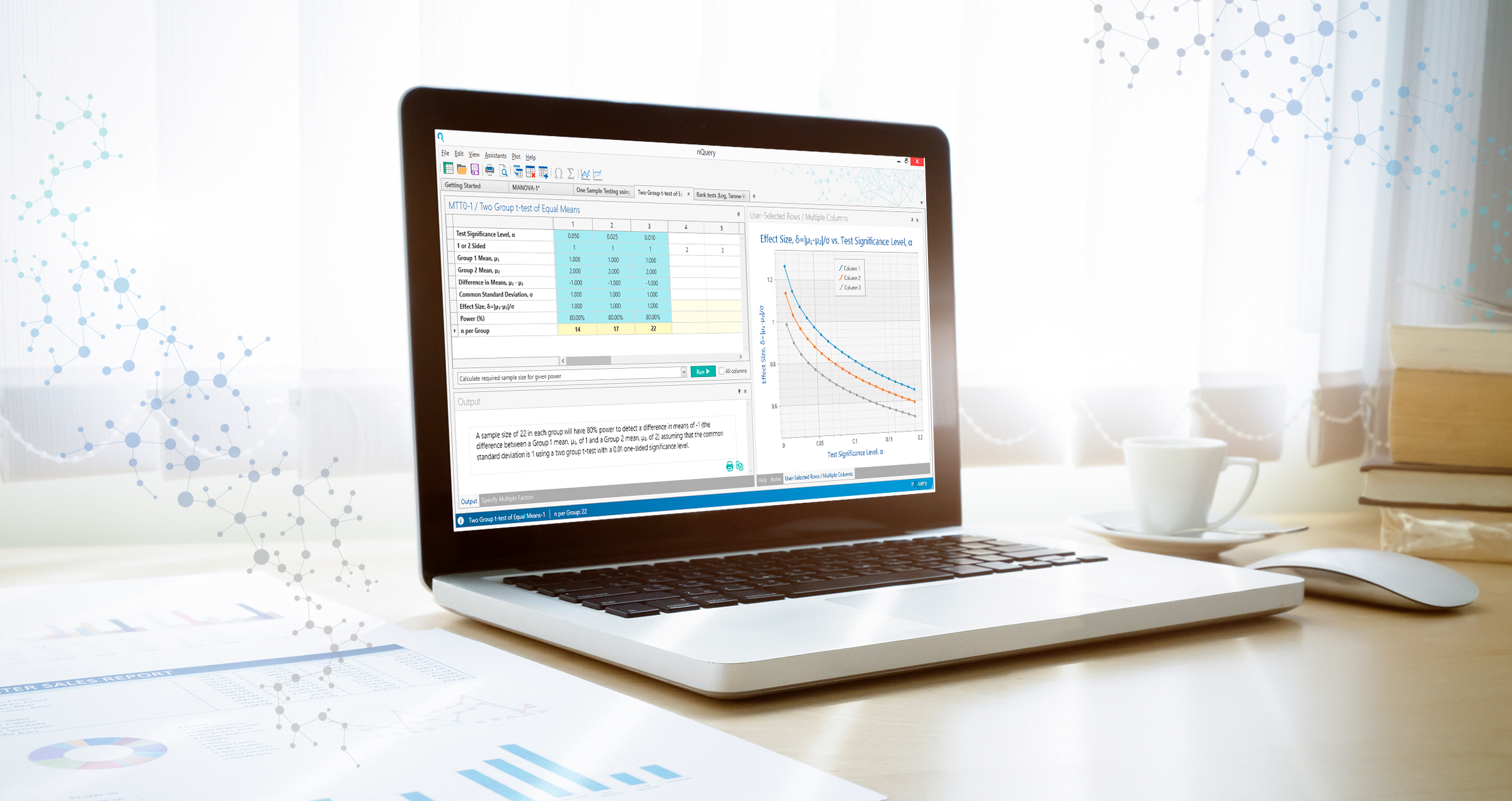What's new in the PRO Tier of nQuery?
The Summer 2020 (v8.6) release sees 5 new sample size tables added to nQuery Advanced PRO tier, covering various new adaptive designs.
In this release, the following areas have been targeted for development:
- Multi-Arm Multi-Stage Designs (MAMS) GSD for Means
- Generalized MCP-Mod (Multiple Comparisons Procedure - Modelling)
- Phase II Group Sequential Tests for Proportions (Fleming’s Design)
Multi-Arm Multi-Stage Designs (MAMS) GSD for Means
Adaptive designs, such as the group sequential design, have become widely used in clinical drug development. However, much of this development has been confined to the two-arm setting. A common situation in clinical trials is that in which an optimal treatment or dose has not been identified prior to the phase III trial. In this situation it may be desirable to begin a Phase II trial (or longer Phase III trial) with several treatment arms and conduct interim analyses that will allow the dropping of less promising arms and potentially seamlessly move those arms into Phase III. This type of design is commonly named a multi-arm multi-stage design.
The Multi Arm Multi Stage (MAMS) group sequential design extends the common two-arm group sequential design to a design in which multiple treatment arms can be compared to a common control arm and allows the trial to be stopped for efficacy or futility based on the best performing arm. In addition, it can be shown that less effective arms may be dropped at interim analyses without affecting the Type I error.
MAMS designs provide the ability to assess more treatments in less time than could be done with a series of two-arm trials and can offer significantly smaller sample size requirements when compared to that required for the equivalent number of two-arm trials.
In this release, a MAMS Group Sequential design has been implemented for a continuous endpoint under normality. This provides a familiar framework with which to conduct a MAMS design and explore the additional flexibility offered.
The table added is as follows:
- Multiple Arms Multiple Stage (MAMS) Group Sequential Design for Means
Generalized MCP-Mod (Multiple Comparisons Procedure - Modelling
MCP-Mod (Multiple Comparisons Procedure - Modelling) is an increasingly popular statistical methodology for dose-finding Phase IIb trials. Since its development at Novartis, MCP-Mod promises to devise proof-of-concept and dose-ranging trials with greater evidence and data that can prove critical for Phase III clinical trial design.
Combining the robustness of multiple comparisons procedures with the flexibility of modelling, MCP-mod combines these methods to provide superior statistical evidence from Phase II trials with regards to dose selection with the FDA & EMA approving MCP-Mod as fit-for-purpose (FFP).
The MCP-Mod methodology has been well developed for the case of normally distributed, homoscedastic data from a parallel group study design. In practice however many other types of endpoints are encountered and often in more complex settings like longitudinal studies for example. Generalized MCP-Mod extends the original MCP-Mod methodology to the context of general parametric models and for general study designs.
In this release, 3 tables will be added for generalized MCP-Mod. This extends the MCP-Mod methodology for a continuous endpoint (released in nQuery 8.5) to one for binary and count endpoints. Similar to the continuous MCP-Mod table, these new tables focus on the proof-of-concept stage of the study.
The tables added are as follows:
- Multiple Comparisons Procedure - Modelling for Poisson Rates (MCP-Mod)
- Multiple Comparisons Procedure - Modelling for Negative Binomial Rates (MCP-Mod)
- Multiple Comparisons Procedure - Modelling for Binary Outcome (MCP-Mod)
Phase II Group Sequential Tests for Proportions (Fleming’s Design)
Typically, a phase II trial is designed to have a single stage in which a certain number of subjects are treated and the number of successes/responses are observed. However for ethical and economic reasons it may be of interest to stop the trial early, in particular for futility due to high failure rates at Phase II.
Based on the method described in Fleming (1982), the Phase II group sequential test is a one-sided multiple testing procedure that allows for early termination of the study if interim results are extreme. This is done by testing the accrued data at a number of interim stages and looking at the point estimate for the proportion of successes or responses observed at interim points.
Under this design, at each of the interim analyses, the trial may be stopped for futility if the interim cumulative number of successes is below an acceptance point and the trial may be stopped for efficacy if the interim number of successes is above a rejection point. In addition to the ethical benefit, this type of design allows for greater flexibility and cost savings while retaining operating characteristics similar to a fixed term trial.
In this release, a table will be added for a Phase II Group Sequential Tests for One Proportion. This is commonly referred to as Fleming’s Design.
The table added is as follows:
- Group Sequential Test of One Proportion (Fleming’s Design)




